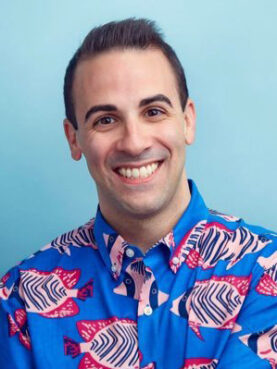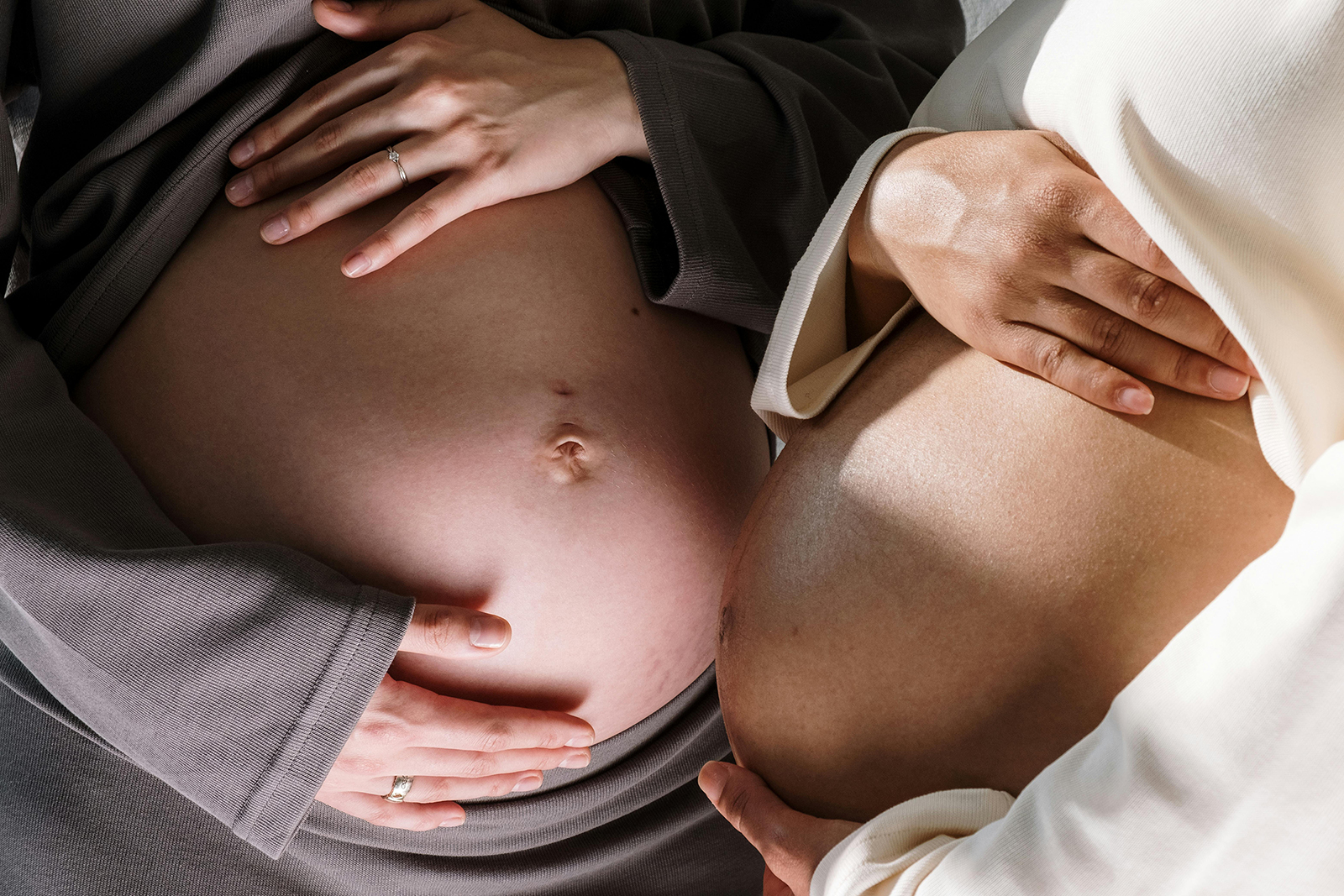
VATICAN CITY (RNS) — Pope Francis’ recent condemnation of surrogacy, which equated the practice with human trafficking, is nothing new in the Catholic Church, but, after he opened the door to same-sex blessings, it felt like a step backward to many in the LGBTQ community and others who look to surrogacy as a path toward building a family.
“I deem deplorable the practice of so-called surrogate motherhood, which represents a grave violation of the dignity of the woman and the child, based on the exploitation of situations of the mother’s material needs,” Pope Francis told ambassadors from all over the world in a long speech at the Vatican at the start of the year.
The pope called for a global ban on surrogacy, which he said turns the child and the mother into “an object of trafficking.” The pope also railed against abortion, in-vitro fertilization and gender ideology in his speech to diplomats.
While many in the Catholic Church share the same views, members of the LGBTQ community and surrogacy advocates were taken aback by the pope’s strong words.
“Like pope Francis I don’t want women to be exploited,” said Brandon Ambrosino, a theologian and ethicist at Villanova University, in an interview with Religion News Service. “But I also know, from personal experience, that it’s possible to pursue third-party reproduction in non-exploitative ways.”

Brandon Ambrosino. (Photo via Villanova)
Ambrosino, a Catholic, and his husband decided they wanted to become parents early on in their relationship. Thanks to a close friend who offered to carry the child, they were able to pursue surrogacy. When Ambrosino read about Francis’ statements, he said he wished the pope would listen to positive experiences like his own.
“I find the pope very open to personal encounters, and I do believe that if he opens his heart to dialogue with intended parents who have pursued IVF he might genuinely be surprised,” he said.
For Abbe Feder, founder of InCircle Fertility, which helps hundreds of individuals facing fertility issues in Los Angeles, the pope’s comments struck a nerve and reverberated through social media and messaging apps in her “tight knit and close” community.
“When Pope Francis’ comments were made, it hit the community like a ton of bricks,” Feder told RNS in an online interview on Monday (Jan. 22). “I don’t think anyone has the right, especially a male leader followed by so many people, to make a judgment on whether surrogacy is ok or not.”
Many couples already face the stigma of not being able to have a child when dealing with infertility issues, she said. “For someone else, who is never going to be a father anyway, to weigh in on that is all the more hurtful and puts us in a defensive and vulnerable position,” she added.

Abbe Feder. (Photo via InCircle Fertility)
Feder, who is Jewish, went through her own challenges with infertility before deciding to share her knowledge with other individuals seeking alternative ways to start a family. She said that as the technology progresses and more insurance companies cover the costs of surrogacy or gestational carriers, the practice is growing rapidly in the United States, and the stigma is diminishing.
The Vatican’s doctrinal office recently allowed the practice of blessing gay couples, which was interpreted as a historic opening for the church. Michael McDonnell, executive director of Survivors Network of those Abused by Priests, or SNAP, praised the Vatican’s decision but said the popes’ statements send mixed signals to LGBTQ individuals.
“Wasn’t the Blessed Mother a surrogate parent?” he said in an interview with Religion News Service on Jan. 12.
The pope’s pronouncements echo the official position of the Catholic Church on these issues, born from its opposition to in-vitro fertilization for both gay and heterosexual couples. A 1987 document by the Vatican’s doctrinal department, led by Cardinal Joseph Ratzinger, opposed surrogacy because it relied on IVF, which results in the freezing and possible destruction of human embryos.
Francis also spoke about surrogacy in 2022, describing it as “inhuman” and dangerous for women.
“The pope has been very clear and explicit,” said Fabrizio Mastrofini, the spokesperson for the Vatican’s Pontifical Academy for Life, a think-tank tasked with addressing the intersection of human dignity and modern technological advancements.
“His position wishes to protect women first of all, so they don’t end up in a spiral of exploitation,” Mastrofini told Religion News Service in a message on Thursday (Jan. 18). The Academy for Life watches technological developments closely, he added, and is committed to promoting the church’s ethical views in light of Catholic Social Doctrine.
Shortly after the pope made his speech, the U.S. Catholic Bishops issued a statement in support of his words. “The commercialization of women and children in surrogacy is underlined by the belief that there is a right to have a child,” read the Jan. 10 statement, signed by Bishop Robert Barron of Winona-Rochester, chairman of the USCCB’s Committee on Laity, Marriage, Family Life, and Youth.
“The desire to utilize surrogacy might feel like the desire to form a family naturally, but no matter how well-intentioned, surrogacy always does grave injustice to the child, any discarded embryos (who are our fellow human beings), the commodified birth mother, and the loving union of the spouses,” it read.

Two pregnant women place hands on their bellies. (Photo by Cottonbro Studio/Pexels/Creative Commons)
Surrogacy is legal in the U.S. where states have passed legislation allowing the practice. Surrogate motherhood is often categorized as either commercial surrogacy, where a woman is paid to carry a child, or altruistic surrogacy, where a woman offers to carry a child for another at no cost. States have passed different laws on surrogacy, sometimes banning commercial surrogacy altogether.
According to one study, over 18,000 children were born in the U.S. via surrogacy between 1999 and 2013. The Centers for Disease Control and Prevention show that the practice is on the rise. The number of embryos carried by surrogate mothers has grown from 2,841 in 2011 to 9,195 in 2019.
The U.S. is currently the only country that allows commercial surrogacy for same-sex couples. While official figures are hard to find, a study of fertility clinics in over 10 cities, conducted by Fertility IQ for the Chicago Tribune, found up to a 50% rise in gay men who have had children via surrogacy between 2011 and 2015.
Surrogacy has turned into a multibillion-dollar market in the United States, where health care costs for the practice average around $140,000.
Globally, surrogacy is a hotly debated issue. Many European countries, like Austria, France, Germany and Italy, ban the practice. In May, Pope Francis joined with Italian right-wing Prime Minister Giorgia Meloni, the first female leader of Italy’s government, to address the country’s declining birth rates at a conference where they made clear that surrogacy does not represent a viable or ethical option.
The Italian government is currently considering legislation that would make using surrogate mothers abroad a criminal offense.
“What’s difficult is that (surrogacies) vary widely based on their context,” Ambrosino said, adding that not all countries provide the robust legal protections that are present for gestational carriers or surrogates in the United States.
“What is completely clear is that the pope is calling on all people of good will to protect the dignity of women and children, and, based on my experience and that of countless other intended parents, it is possible to protect the dignity of women and children while pursuing third-party reproduction,” he added.
